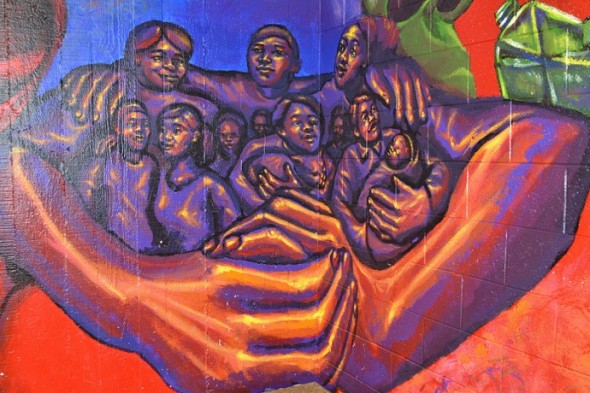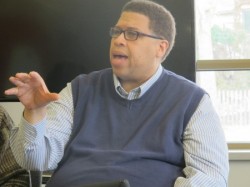The Settlement Houses of Milwaukee
Eight neighborhood centers in the city are based on the approach of Jane Addams' famed Hull House.

A mural at Neighborhood House of Milwaukee captures the spirit of the settlement house. (Photo by Sue Vliet)
In 1889, Jane Addams co-founded Chicago’s Hull House, a “settlement house,” where a wide range of services were offered in one place for immigrants and the poor. Less than 20 years later, Hull House services included a music school, boys’ club, cooperative residence for working women, nursery, post office and kitchen.
The settlement house model is alive and well in Milwaukee, explained Tony Shields, executive director of United Neighborhood Centers of Milwaukee. The eight neighborhood centers under the UNCOM umbrella offer services similar to those offered at Hull House, and have expanded to include others.
“UNCOM has settlement houses in all distressed zip codes in the city,” Shields said. “Each center has resources to improve the lives of people in Milwaukee and allows UNCOM to work efficiently and as a one-stop shop for cross-community planning.”
Four executive directors from UNCOM member agencies joined Shields at a recent workshop sponsored by LISC as part of a daylong community symposium called “Whole Neighborhoods…One Milwaukee.”
Richard Cox, executive director of Neighborhood House of Milwaukee, said that the organization’s International Learning Center, which offers adult and family literacy and employment skills training to more than 700 refugees and immigrants a year, was inspired by the settlement house movement. Neighborhood House also has programs that cater to teens, health, education and environment.

UNCOM executive director Tony Shields answers a question during the workshop. (Photo by Shakara Robinson)
The Milwaukee Christian Center (MCC), founded 92 years ago, was built upon settlement house principles, said Executive Director Karen Higgins. MCC started with immigrant houses, known as “hot spots,” on the city’s South Side. Today, the center offers programs and services to senior citizens and juveniles, and has an emergency food pantry to help needy families survive, just as Hull House did.
Hull House developed programs that focused focus on children and education, and influenced change beyond the walls of the center by pressing local leadership for new public schools, fighting for branch libraries and building the city’s first public playground and bathhouse.
Similarly, COA Youth and Family Centers works with children and families, offering resources to about 16,000 children and families year, according to Tom Schneider, executive director.
“A parent is the child’s first and most important teacher,” Schneider said. “Our programs offer true extra-curricular activities that help advance students and get parents involved in the process.”
Anthony McHenry, executive director of the Silver Spring Neighborhood Center, said the center serves Milwaukee’s northwest side and Westlawn, the state’s largest public housing development. Like the boys’ club at Hull House, the center’s weekly talk group, “Teen Talk,” provides a safe place for young people to discuss personal and intimate experiences.
Building on the spirit of collaboration seen at Hull House, UNCOM’s model encourages member centers to work together — rather than competing with one another – while remaining unique, Schneider said.
In the last year, UNCOM member agencies have served more than 63,000 local area residents. Programs include preschool, daycare, after-school and teen activities, healthcare, meal and food pantries, home and neighborhood improvement, literacy, adult education, and sports and recreation, according to the UNCOM website.
“The idea of settlement houses and what they originally did is not far from what these neighborhood settlement houses do today, and that is empowering people to become more self-sufficient and providing them with the services they need to push forward with their lives,” Shield said.
Editor’s note: UNCOM is the publisher of Milwaukee Neighborhood News Service.
This story was originally published by Milwaukee Neighborhood News Service, where you can find other stories reporting on fifteen city neighborhoods in Milwaukee.

















Why use Chicago as an example? Milwaukee was home to the well-known Jewish Settlement House, established by Elizabeth Kander in 1900 from the merger of two similar groups. It was nationally known for its Settlement Cook Book, which to date has sold more than 2 million copies.
The Milwaukee settlement houses deserve praise for their years of consistently effective service. Unlike Milwaukee’s Community Development Corporations like ESHAC, West Side Housing Coop and OIC, which all got in trouble (the notable exception is Howard Snyder’s successful NW Side CDC), the settlement houses have operated effectively without malfeasance or corruption. UWM Social Work Professor Ray Richardson set the tone at Neighborhood House in the 60s and 70s. He and his staff ran a tight ship and helped thousands of near West Side kids onto a productive path.